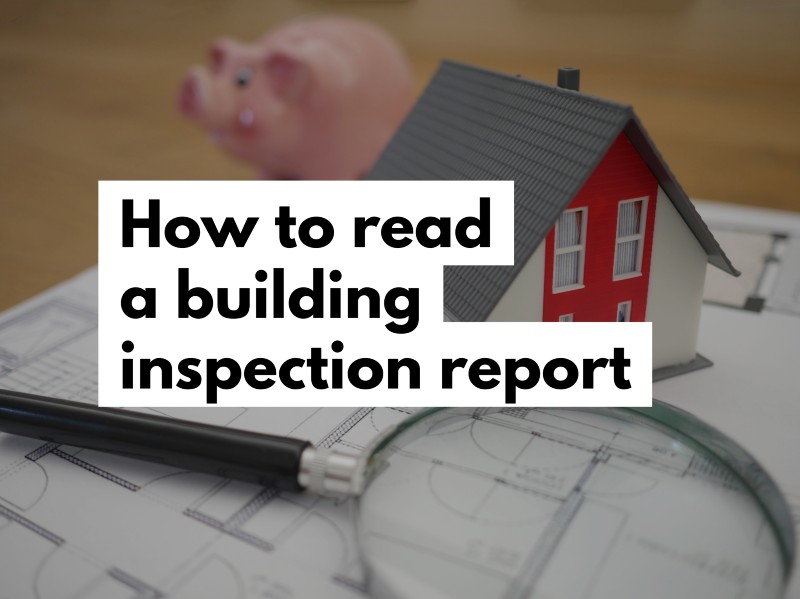
When buying a home, coming to an agreement with the owners on price is just the first hurdle.
The second, and often biggest barrier to progress is the builder’s report.
The ‘builder’s report’ is an inspection, usually commissioned by the buyer, where a qualified inspector goes through the property with a fine-tooth comb. They look for any signs of damage (old or existing) and any types of materials that are considered less than optimal.
This could happen before, or after the purchase price has been agreed.
A building inspection could be considered a risk assessment for real estate buyers. It will help you understand what your future maintenance responsibilities might be if you go ahead with the purchase.
The sticking point often comes down to expectations. There is no such thing as a perfect builders report. Even new homes may have small imperfections or design features that the inspector feels concerned about.
For older homes, the list of imperfect details and upcoming repairs can be extensive.
As a buyer, it’s important to keep everything in perspective. Here are 5 suggestions to keep in mind when you review your builder’s report.
Tip 1: Prepare yourself.
Before you start reading the report, remember that a building inspector’s job is to find everything that might possibly be wrong or less than ideal with the property.
They are not there to tell you good things about your future home. You won’t find a pros and cons list in the appendix.
As a buyer taking a leap into the unknown, you may be aching for reassurance that you are doing the right thing. You will not get this reassurance from a builders report. In fact, reading any builders report may seriously test your resolve to become a property owner.
Tip 2: Seek perspective.
In nearly every case, a builder’s report will find aspects of the property that are less than ideal and will cost thousands to change or fix. Building standards change and improve over time, so it’s hard for a 50-year old home to measure up to a new build.
Consider the following questions when reviewing your inspection report…
Is this a common problem? Eg. If I visited my parents/friends house would they likely have things like this happening as well?
Does it need to be fixed urgently? Eg. Do I need to deal with it now? Or can it wait 1 year, 3 years, or 5 years?
Tip 3: Translate builder-speak.
Being a building inspector is a tough job. If they underestimate a problem they can end up with very upset customers. They can’t see through walls, so they need to prepare potential buyers for the worst-case scenario to protect everyone involved in the event a problem turns out to be bigger than visible signs portray.
Don’t hesitate to call and speak to your builder to talk through any concerns. When issues are discussed verbally they often sound less frightening than they do in writing.
Bonus tip: Meet the builder on-site at the end of their inspection to discuss any important issues face to face and gain valuable context around the risk involved.
Tip 4: Ask for a price estimate.
Inspectors will often have first-hand, practical building experience and can sometimes provide a rough estimate of the cost to fix an issue found in the report.
Ask the inspector: If this was your home, what would you do to rectify this? How much is that solution likely to cost?
Tip 5: Prepare yourself for common issues.
Every construction era has its common problems. One may contain a style of plumbing that has proven to be less than reliable. Others may have an original roofing system that deteriorates quickly. Houses from one era might have an exterior cladding system that needs careful ongoing maintenance.
The message here is that there are very few perfect houses. Older style homes can come with more ongoing maintenance jobs but are usually positioned in the most attractive spots – on sunny sections with established trees, close to shops and transport.
In Summary…
Ask lots of questions. Seek clarification on any major issue. Is it dangerous? How soon do you need to tackle it? How much will it cost to fix?
Most importantly, remind yourself why you liked the house in the first place. Think about the features that don’t show up in a builders report, like sun aspect, access, location and school zoning.
If you still like the home but feel the necessary repairs are beyond your budget, speak to your real estate professional to see if a solution can be found. Some owners will come to the party and make repairs or contribute to the cost. Ensure you have pursued every option before you give up on a home you love.
Get good advice early. Call us for an independent and honest chat.
We will tell you what you need to hear, NOT what you want to hear.


